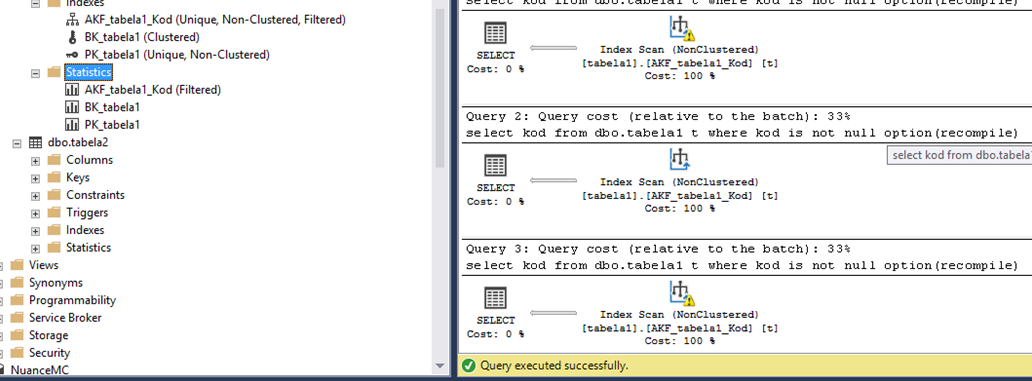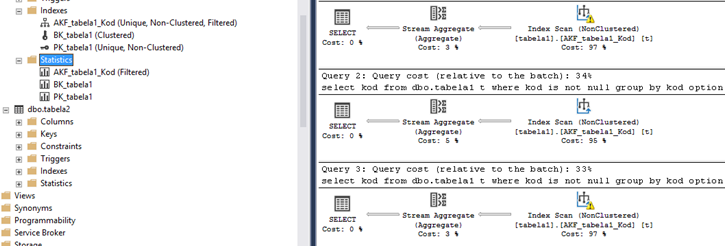the Estimated Number of Rows property for [table1] shows 10. Why is
this? In the schema (copied below) I have a unique index
AKF_tabela1_Kod. Shouldn't this unique index force the row estimation
to be 1?
The statistics are created when creating the unique index, but as a result of the unique index being filtered, the statistics are also filtered.
(where kod is not null).
As a result, the query as it is cannot use these statistics.
Why?
The Index can be used, but the statistics are not a match for the query.
Even if you do a select on kod:
select kod from dbo.tabela1 t
where kod is not null option(recompile)
The statistics are still no match:

If you do a select of the id however:
select id from dbo.tabela1 t
where kod is not null option(recompile)
There is a match:

This seems to be buggy with auto create stats:
ALTER DATABASE my_test SET AUTO_CREATE_STATISTICS ON;
select kod from dbo.tabela1 t
where kod is not null option(recompile)
This does not create stats for some reason, but is still able to do the correct estimation.

No new stats:

Re running this:
ALTER DATABASE my_test SET AUTO_CREATE_STATISTICS OFF;
select kod from dbo.tabela1 t
where kod is not null option(recompile)
Gives the same warning:

This seems to be an issue with auto create statistics being off, even though no stats are created.
I am not sure, but an estimate of 10 might be a 'default' value to use, like when using a table variable.
Workarounds:
1
If you create the next index, the result will be 1 estimated rows
CREATE UNIQUE NONCLUSTERED INDEX [AKF_tabela1_Kod2]
ON dbo.[tabela1]([Kod] ASC)
INCLUDE ([id])
WITH (ALLOW_ROW_LOCKS = ON, ALLOW_PAGE_LOCKS = ON, MAXDOP = 0);
GO
2
Another route you could take is creating your own statistics:
create statistics ST_Tablea1_Kod on dbo.tabela1(kod)
Retry the query (with a new execution plan):
SELECT *
FROM tabela2 x
LEFT JOIN dbo.tabela1 t with (nolock) on t.Kod = x.Kod option(recompile)


3
Or ofcourse, enable auto create statistics and rerun the query:
ALTER DATABASE my_test SET AUTO_CREATE_STATISTICS ON;
Update:
The below queries give a stat missing on the first execution, but not on the other two. A statistic was created by auto create stats.
SELECT *
FROM tabela2 x
LEFT JOIN dbo.tabela1 t with (nolock) on t.Kod = x.Kod option(recompile)
ALTER DATABASE my_test SET AUTO_CREATE_STATISTICS ON;
SELECT *
FROM tabela2 x
LEFT JOIN dbo.tabela1 t with (nolock) on t.Kod = x.Kod option(recompile)
ALTER DATABASE my_test SET AUTO_CREATE_STATISTICS OFF;
SELECT *
FROM tabela2 x
LEFT JOIN dbo.tabela1 t with (nolock) on t.Kod = x.Kod option(recompile)

Dropping the stats and retrying with a select:
drop statistics dbo.tabela1.[_WA_Sys_00000003_0EA330E9]
select kod from dbo.tabela1 t
where kod is not null option(recompile)
ALTER DATABASE my_test SET AUTO_CREATE_STATISTICS ON;
select kod from dbo.tabela1 t
where kod is not null option(recompile)
ALTER DATABASE my_test SET AUTO_CREATE_STATISTICS OFF;
select kod from dbo.tabela1 t
where kod is not null option(recompile)
Does not generate stats, and gives the same missing index hints on the first and third execution:

I thought that this maybe was because of the optimization level being trivial. But this was not the case.
StatementOptmLevel="TRIVIAL"
Non trivial optimization level:
select kod from dbo.tabela1 t
where kod is not null
group by kod option(recompile)
ALTER DATABASE my_test SET AUTO_CREATE_STATISTICS ON;
select kod from dbo.tabela1 t
where kod is not null group by kod option(recompile)
ALTER DATABASE my_test SET AUTO_CREATE_STATISTICS OFF;
select kod from dbo.tabela1 t
where kod is not null group by kod option(recompile)
Result:

Query #2 with automatic stat creation:
 (I added 100 rows for a total of 200)
(I added 100 rows for a total of 200)
Query #3 , after putting automatic stat creation off again:
 (180 estimated rows)
(180 estimated rows)
As a conclusion, this should have something to do with automatic stat creation being disabled.
My guess is on some sort of temporary stats or the way the plan is created.
I checked if i could find any 'temp'stats that are created at runtime,
but i did not find anything.
(select * from sys.stats where is_temporary = 1)













